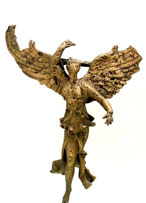| Author | |
|---|---|
| Epoch | 1926-1999 |
| Work | Lamentation (Elguja Maghradze, Two Novels, Tbilisi, 1984) |
| Type | |
| Quote | “Vergil’s worthy translations have been printed in Europe since the 30-s of the XVIII century […] and who did not write about Vergil! The mosaic found in Bordeaux Museum in Tunisia (Tunis) has preserved his only, rather authentic portrait for the mankind. The poet born near Mantua, had spent his life mostly in Naples, peacefully and calmly, only when Caesar Octavian threatened the Empire with land confiscations and Vergil’s father was also under the threat of land confiscation, the poet travelled to Rome, came to the Emperor and retained their land. That was the time when the poet wrote “Bucolics”. Vergil also loved land… He also strove to create the national epos and the Emperor Octavian entrusted him with this great undertaking; having gone to perfect the Greek “Aeneid” and returning by the Emperor’s boat itself, the poet died on the way back, at the age of 51. Vergil mentions his three main works in his epitaph: I was born in Mantua, but Calabria possessed me, I was buried in Parthenopea; I was extolling the pastures, Villages and leaders […] We know from the Bible, Hesiod will also corroborate, like all the distinguished authoritative people of antiquity, […] that shepherds, cattle breeders and nomads in mountains and valleys had been indulging in amorous affairs […] The father of Bucolic poetry was considered to be Sicilian Theocritus – of Syracuse”. (pg. 263-264) |
| Term |
|

| Comment |
|---|

